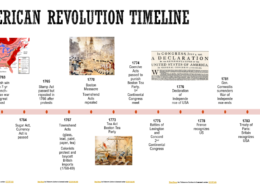What were the primary grievances of the American colonists that led to the outbreak of the American Revolution, and how did these grievances shape the course of events?
Issues like taxation without representation and colonial grievances were significant contributors to the outbreak of the American Revolution: Taxation Without Representation: The British government imposed taxes on the colonies (e.g., Stamp Act, Townshend Acts) without providing them representationRead more
Issues like taxation without representation and colonial grievances were significant contributors to the outbreak of the American Revolution:
- Taxation Without Representation:
- The British government imposed taxes on the colonies (e.g., Stamp Act, Townshend Acts) without providing them representation in the British Parliament.
- Colonists believed this violated their rights as Englishmen, leading to widespread protest and the rallying cry, “No taxation without representation.”
- Economic Burdens:
- Various taxes and trade restrictions harmed colonial businesses and economies.
- Acts like the Navigation Acts and the Tea Act created economic hardships and resentment towards British control.
- Political Autonomy:
- Colonists desired more control over their own governance and resented British interference in colonial affairs.
- The dissolution of local legislatures and imposition of British-appointed governors fueled anger and demands for self-governance.
- Violent Clashes:
- Incidents like the Boston Massacre and confrontations at Lexington and Concord highlighted the escalating tensions and contributed to the willingness to take up arms against British forces.
- Intellectual Movement:
- Enlightenment ideas emphasized individual rights and questioned absolute authority, influencing colonial leaders and intellectuals.
- Writings and speeches by figures like Thomas Paine, John Adams, and Patrick Henry spread revolutionary ideas and mobilized public opinion.
- Punitive Measures:
- British responses to colonial protests, such as the Intolerable Acts, further united the colonies against perceived tyranny.
- These measures included closing Boston Harbor and revoking Massachusetts’ charter, seen as collective punishment for resistance.
Together, these issues created a sense of injustice and a desire for independence, ultimately leading to the American Revolution.
See less

The recent Trump campaign could have a significant impact on the upcoming elections in various ways. Firstly, Trump's continued influence within the Republican Party may lead to increased division and infighting among party members. This could potentially weaken the GOP's overall position and makeRead more
The recent Trump campaign could have a significant impact on the upcoming elections in various ways. Firstly, Trump’s continued influence within the Republican Party may lead to increased division and infighting among party members. This could potentially weaken the GOP’s overall position and make it more challenging for them to present a united front in the elections.
Additionally, Trump’s controversial statements and actions may energize his base of supporters, leading to higher turnout among his loyal followers. This could benefit Republican candidates who align themselves closely with Trump’s agenda but may also alienate more moderate voters and independents.
Furthermore, Trump’s involvement in the campaign could overshadow other candidates and shift the focus of the election away from key policy issues. This could make it more difficult for candidates to effectively communicate their platforms and connect with voters on important issues.
Overall, the impact of the recent Trump campaign on the elections is likely to be complex and multifaceted, with potential consequences for voter turnout, party unity, and the overall tone and direction of the campaign.
See less